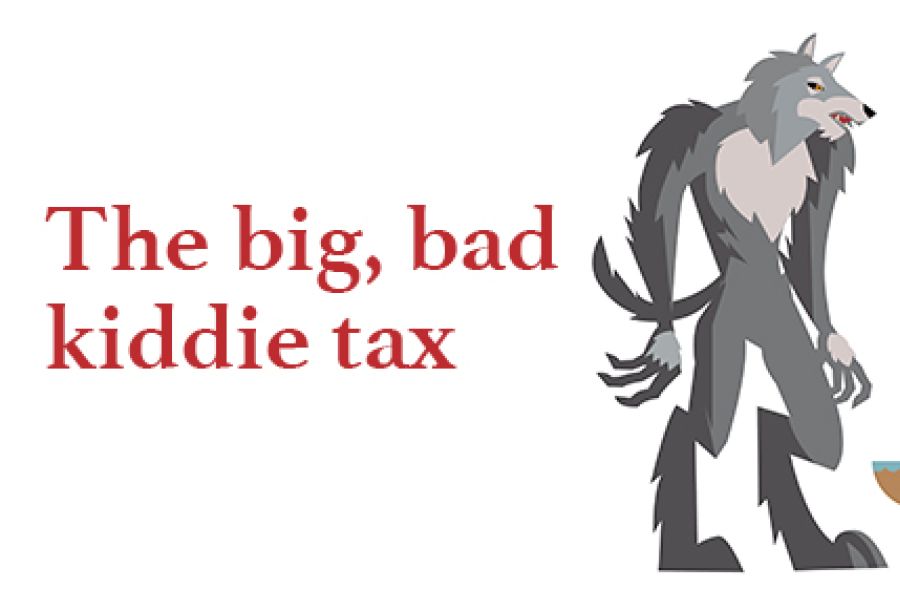Once upon a time, some parents and grandparents would attempt to save tax by putting investments in the names of their young children or grandchildren in lower income tax brackets. To discourage such strategies, Congress created the “kiddie” tax back in 1986. Since then, this tax has gradually become more far-reaching. Now, under the Tax Cuts and Jobs Act (TCJA), the kiddie tax has become more dangerous than ever. A short history Years ago, the kiddie tax applied only to children under age 14 — which still provided families with ample opportunity to enjoy significant tax savings from income shifting. In 2006, the tax was expanded to children under age 18. And since 2008, the kiddie tax has generally applied to children under age 19 and to...

With its many changes to individual tax rates, brackets and breaks, the Tax Cuts and Jobs Act (TCJA) means taxpayers need to revisit their tax planning strategies. Certain strategies that were once tried-and-true will no longer save or defer tax. But there are some that will hold up for many taxpayers. And they’ll be more effective if you begin implementing them this summer, rather than waiting until year end. Take a look at these three ideas, and contact us to discuss what midyear strategies make sense for you. Look at your bracket Under the TCJA, the top income tax rate is now 37% (down from 39.6%) for taxpayers with taxable income over $500,000 (single and head-of-household filers) or $600,000 (married couples filing jointly). These...
The Tax Cuts and Jobs Act (TCJA) ushered in significant changes to familiar business expenses . . . expenditures for meals and entertainment. This Tax Planning Letter, as well as Part 1 (#356), seeks to demonstrate that, while the deductibility of many entertainment expenses have been terminated after 2017, some do remain. A number of meal expenses also evade the clampdown. Part 2 covers: the rules for the deduction of employer-provided employee meals on company premises, and genres of expenses exempt from statutory restrictions on meals and entertainment See Part 1 (#356) for an overview of TCJA changes and a discussion of whether a so-called ''business meal'' (one in which a substantial and bona fide business discussion is present during the event) continues to be deductible...
The Tax Cuts and Jobs Act (TCJA) ushered in significant changes to familiar business expenses . . . expenditures for meals and entertainment. This Tax Planning Letter, as well as next month’s Part 2, seeks to demonstrate that, while the deductibility of many entertainment expenses have been terminated after 2017, some do remain. Likewise, while some meal expenses are also spared non-deductbility, questions linger as to the deductibility of the most familiar type of meal expense . . . that being the so-called "business meals" during which a meaningful and authentic discussion of business is present during the meal. Part 1 provides an overview of the changes brought about by TCJA and analyzes whether a "business meal" can continue to be deducted under TCJA. Part 2...
For tax years beginning in 2018 and beyond, the Tax Cuts and Jobs Act (TCJA) created a flat 21% federal income tax rate for C corporations. Under prior law, C corporations were taxed at rates as high as 35%. The TCJA also reduced individual income tax rates, which apply to sole proprietorships and pass-through entities, including partnerships, S corporations, and, typically, limited liability companies (LLCs). The top rate, however, dropped only slightly, from 39.6% to 37%. On the surface, that may make choosing C corporation structure seem like a no-brainer. But there are many other considerations involved. Conventional wisdom Under prior tax law, conventional wisdom was that most small businesses should be set up as sole proprietorships or pass-through entities to avoid the double taxation of C corporations:...
The massive changes the Tax Cuts and Jobs Act (TCJA) made to income taxes have garnered the most attention. But the new law also made major changes to gift and estate taxes. While the TCJA didn’t repeal these taxes, it did significantly reduce the number of taxpayers who’ll be subject to them, at least for the next several years. Nevertheless, factoring taxes into your estate planning is still important. Exemption increases The TCJA more than doubles the combined gift and estate tax exemption and the generation-skipping transfer (GST) tax exemption, from $5.49 million for 2017 to $11.18 million for 2018. This amount will continue to be annually adjusted for inflation through 2025. Absent further congressional action, however, the exemptions will revert to their 2017 levels (adjusted for inflation)...
If you own a business and have a child in high school or college, hiring him or her for the summer can provide a multitude of benefits, including tax savings. And hiring your child may make more sense than ever due to changes under the Tax Cuts and Jobs Act (TCJA). How it works By shifting some of your business earnings to a child as wages for services performed, you can turn some of your high-taxed income into tax-free or low-taxed income. For your business to deduct the wages as a business expense, the work done must be legitimate and the child’s wages must be reasonable. Here’s an example: A sole proprietor is in the 37% tax bracket. He hires his 20-year-old daughter, who’s majoring in marketing,...
It’s not uncommon for businesses to sometimes generate tax losses. But the losses that can be deducted are limited by tax law in some situations. The Tax Cuts and Jobs Act of 2017 (TCJA) further restricts the amount of losses that sole proprietors, partners, S corporation shareholders and, typically, limited liability company (LLC) members can currently deduct — beginning in 2018. This could negatively impact owners of start-ups and businesses facing adverse conditions. Before the TCJA Under pre-TCJA law, an individual taxpayer’s business losses could usually be fully deducted in the tax year when they arose unless: The passive activity loss (PAL) rules or some other provision of tax law limited that favorable outcome, or The business loss was so large that it exceeded taxable income from...
The Tax Cuts and Jobs Act of 2017 (TCJA) has caused some changes in the area of home mortgage interest deductions. While a good amount of existing homeowners will not be impacted due to grandfather provisions that keep certain prior-law rules in place, other homeowners will be negatively impacted by a new provision that generally disallows interest deductions for home equity loans for tax years 2018-2025. This Tax Planning Letter outlines what you need to be aware of regarding TCJA’s impact on home mortgage interest deductions. TABLE OF CONTENTS HOME MORTGAGE INTEREST: Pre-TCJA HOME MORTGAGE INTEREST: TCJA "Home acquisition indebtedness" under TCJA "Home equity indebtedness" under TCJA $1 million of "home acquisition indebtedness" grandfather rules under TCJA Taxpayers who can disregard TCJA changes HOME MORTGAGE INTEREST: Pre-TCJA Prior to TCJA, a taxpayer was allowed...
If you received a large refund after filing your 2017 income tax return, you’re probably enjoying the influx of cash. But a large refund isn’t all positive. It also means you were essentially giving the government an interest-free loan. That’s why a large refund for the previous tax year would usually indicate that you should consider reducing the amounts you’re having withheld (and/or what estimated tax payments you’re making) for the current year. But 2018 is a little different. The TCJA and withholding To reflect changes under the Tax Cuts and Jobs Act (TCJA) — such as the increase in the standard deduction, suspension of personal exemptions and changes in tax rates and brackets — the IRS updated the withholding tables that indicate how much employers should hold...











